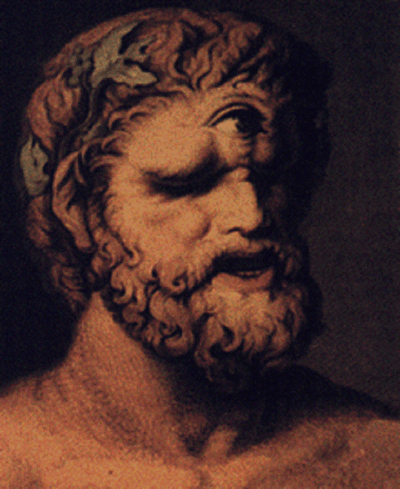[Notes by LKG]
This story is part of the Odyssey unit. Story source: Homer's Odyssey, translated into English by Tony Kline. (2004).
Then I ordered the rest of my loyal friends to stay there and guard the ship, while I selected the twelve best men and went forward. I took with me a goatskin filled with dark sweet wine that Maron, son of Euanthes, priest of Apollo guardian god of Ismarus, had given me, because out of respect we protected him, his wife and child. He offered me splendid gifts, seven talents of well-wrought gold, and a silver mixing-bowl: and wine, twelve jars in all, sweet unmixed wine, a divine draught. None of his serving-men and maids knew of this store, only he and his loyal wife, and one housekeeper. When they drank that honeyed red wine, he would pour a full cup into twenty of water, and the bouquet that rose from the mixing bowl was wonderfully sweet: in truth no one could hold back. I filled a large goatskin with the wine, and took it along, with some food in a bag, since my instincts told me the giant would come at us quickly, a savage being with huge strength, knowing nothing of right or law.
Soon we came to the cave and found him absent; he was grazing his well-fed flocks in the fields. So we went inside and marvelled at its contents. There were baskets full of cheeses, and pens crowded with lambs and kids, each flock with its firstlings, later ones, and newborn separated. The pails and bowls for milking, all solidly made, were swimming with whey. At first my men begged me to take some cheeses and go, then to drive the lambs and kids from the pens down to the swift ship and set sail. But I would not listen, though it would have been best, wishing to see the giant himself, and test his hospitality. When he did appear he proved no joy to my men.
So we lit a fire and made an offering, and helped ourselves to the cheese, and sat in the cave eating, waiting for him to return, shepherding his flocks. He arrived bearing a huge weight of dry wood to burn at suppertime, and he flung it down inside the cave with a crash. Gripped by terror we shrank back into a deep corner. He drove his well-fed flocks into the wide cave, the ones he milked, leaving the rams and he-goats outside in the broad courtyard.
Then he lifted his door, a huge stone, and set it in place. Twenty-two four-wheeled wagons could not have carried it, yet such was the great rocky mass he used for a door. Then he sat and milked the ewes, and bleating goats in order, putting her young to each. Next he curdled half of the white milk, and stored the whey in wicker baskets, leaving the rest in pails for him to drink for his supper.
When he had busied himself at his tasks, and kindled a fire, he suddenly saw us, and said: “Strangers, who are you? Where do you sail from over the sea-roads? Are you on business, or do you roam at random, like pirates who chance their lives to bring evil to others?”’
Trapped
His answer was devoid of pity. “Stranger, you are a foreigner or a fool, telling me to fear and revere the gods, since the Cyclopes care nothing for aegis-bearing Zeus: we are greater than they. I would spare neither you nor your friends, to evade Zeus’ anger, but only as my own heart prompted. But tell me, now, where you moored your fine ship, when you landed. Was it somewhere nearby, or further off? I’d like to know.”
His words were designed to fool me, but failed. I was too wise for that, and answered him with cunning words: “Poseidon, Earth-Shaker, smashed my ship to pieces, wrecking her on the rocks that edge your island, driving her close to the headland so the wind threw her onshore. But I and my men here escaped destruction.”
Devoid of pity, he was silent in response, but leaping up laid hands on my crew. Two he seized and dashed to the ground like whelps, and their brains ran out and stained the earth. He tore them limb from limb for his supper, eating the flesh and entrails, bone and marrow, like a mountain lion, leaving nothing.
Helplessly we watched these cruel acts, raising our hands to heaven and weeping. When the Cyclops had filled his huge stomach with human flesh, and had drunk pure milk, he lay down in the cave, stretched out among his flocks. Then I formed a courageous plan to steal up to him, draw my sharp sword, and feeling for the place where the midriff supports the liver, stab him there.
But the next thought checked me. Trapped in the cave we would certainly die, since we’d have no way to move the great stone from the wide entrance. So, sighing, we waited for bright day.
Next: The Cyclops Defeated
(1000 words)
